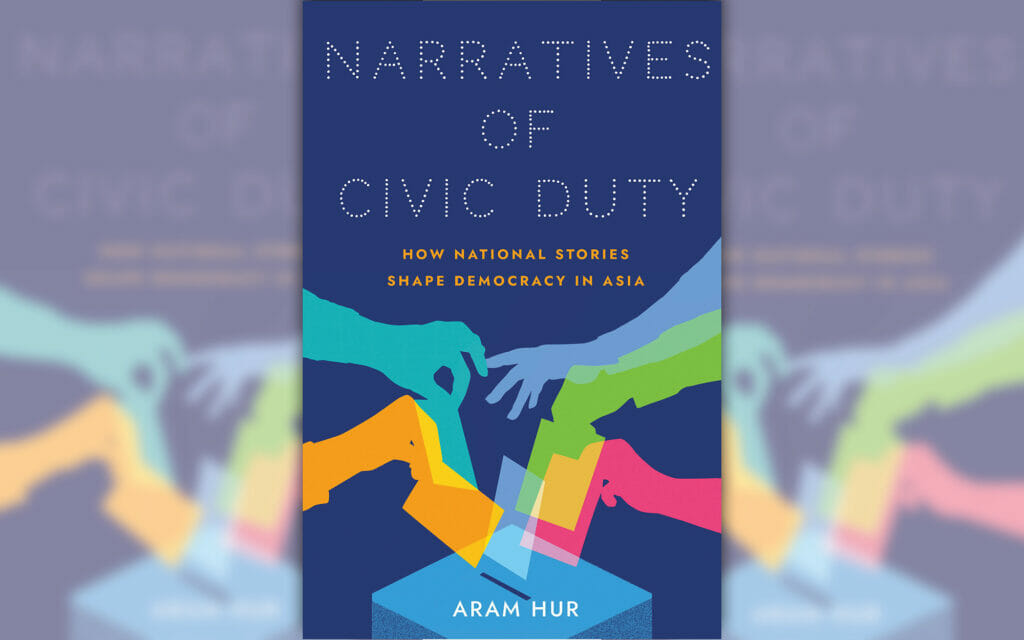Narratives of Civic Duty: How National Stories Shape Democracy in Asia
Speaker:
Aram Hur
Kim Koo Chair in Korean Studies; Assistant Professor of Political Science, Fletcher School of Law & Diplomacy, Tufts University
Thursday, August 24, 2023 | 12:15 - 1:30 pm | Virtual - Zoom Webinar

On Thursday, August 24th, the Clements-Strauss Asia Policy Program and the Center for East Asian Studies hosted Aram Hur, Kim Koo Chair in Korean Studies and Assistant Professor of Political Science at the Fletcher School of Law & Diplomacy, Tufts University, for a book talk on her recent release “Narratives of Civic Duty: How National Stories Shape Democracy in Asia.”
 Aram Hur is the Kim Koo Chair in Korean Studies and Assistant Professor of Political Science at the Fletcher School of Law & Diplomacy, Tufts University. Her research focuses on nationalism and democracy, with special attention to issues of identity, integration, and democratic support in East Asia.
Aram Hur is the Kim Koo Chair in Korean Studies and Assistant Professor of Political Science at the Fletcher School of Law & Diplomacy, Tufts University. Her research focuses on nationalism and democracy, with special attention to issues of identity, integration, and democratic support in East Asia.
Professor Hur is the author of Narratives of Civic Duty: How National Stories Shape Democracy in Asia (Cornell University Press, 2022), which won the 2023 Robert A. Dahl Award for best book on democracy by an untenured scholar from the American Political Science Association. Her research appears in leading disciplinary journals such as the British Journal of Political Science, Comparative Politics, and Comparative Political Studies and is widely cited in domestic and international media. She was selected as the 2021 Sherman Emerging Scholar by The Korea Society, a 2018-19 CSIS US-Korea NextGen Scholar, and is the recipient of the 2023 Gold Chalk Award for Teaching from the University of Missouri. She holds a Ph.D. in Politics from Princeton University, an M.P.P. from the Harvard Kennedy School, and a B.A. with honors from Stanford University.
Book Description:
Aram Hur’s Narratives of Civic Duty: How National Stories Shape Democracy in Asia is an impressive, theoretically rich, and empirically strong contribution to the field of comparative politics. The book seeks to answer the question: Why do some citizens feel it is their responsibility to vote, to pay taxes, or to do military service while others do not? Studying this question in East Asia, in particular a comparison between South Korea and Taiwan, Hur makes the argument that civic duty is grounded in a sense of obligation to the community, implying civic duty is rooted in nationalism. In making this argument, Hur asserts that nationalism is not inherently opposed to democracy. Instead, the impact of nationalism on democracy depends on the historical connection between a nation and its democratic governance. If national narratives depict this connection as a mutual commitment, nationalism can enhance democracies by inspiring a sense of civic responsibility among the populace. The empirical analyses that support this argument rely on an impressively broad range of methods and approaches, including analyses of personal narratives of young citizens, large N-survey analyses, and original survey experiments. Hur’s Narratives of Civic Duty makes two important contributions to comparative politics literature. First, Hur draws attention to the importance of civic duty for democratic governance – in this way giving a central place to an attitude that we still know little about. Second, examining non-Western countries where democracy has historically been weak, she shows that nationalism can have favorable effects on democracy – challenging conventional wisdom
For more information about this event, contact Mara Sherry at [email protected].




